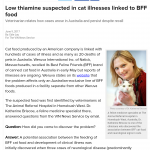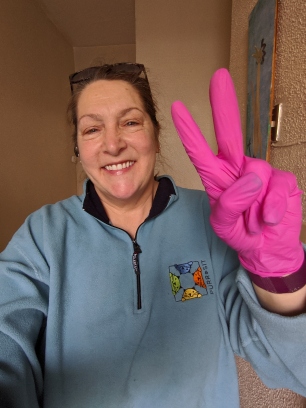Back in early May of 2017, TruthAboutPetFood.com put up a post about Weruva having some trouble in Australia. It was more than some trouble, cats were dead and dying. They all had only Weruva in common. Weruva was pulled from shelves in Australia. People in my mostly-US-based circle couldn’t believe it, high-quality Weruva is a go-to for so many of us with digestively compromised kitties and none of us had trouble. It seemed at the time of TAPF’s post that Weruva was gung-ho to resolve the problem and clear their name. “YAY WERUVA!”, we all posted. Everyone was thrilled that a pet food company was finally taking responsibility and promising transparency.
Important announcement from Weruva:
We are aware of a small number of cats in Australia with health concerns, and we are researching any potential link to BFF canned foods unique to the Australian market. Out of an abundance of caution we have issued a Stop Sale Notice for BFF canned foods in Australia only. Once we receive test results and more information, we can quickly provide further updates. Customers outside of Australia, please be assured that all Weruva foods remain a safe choice.
Since this is a developing issue we have limited confirmed facts, and we want to keep you informed of the actions we are taking. We ask that you contact us directly at wecare@weruva.com or call us at 1-800-108-382 from Australia or at 1-800-776-5262 from North America. Please do not hesitate to contact us with any questions or concerns.

Uh-Oh
We all sorta forgot to make sure Weruva followed through until yesterday when this little tidbit from the VIN News (Veterinary Information Network News) showed up in my newsfeed (like I said, my circle is a little geeky about feline health!)
Low thiamine suspected in cat illnesses linked to BFF food – The title references a Weruva product called BFF.
What does low thiamine mean for cats, exactly? According to the VIN News article, several symptoms may be evident such as fever, diarrhea, vomiting, neurological damage and pockets of fluid buildup in the chest and abdominal cavities. Some of these symptoms have either killed cats outright or led to their “required euthanasia”, essentially it became a quality of life issue.
The most disturbing part of the interview in this article is the very last question:
Q: Has Weruva been sharing information with veterinary researchers or other organizations in Australia? We tried to reach them but have received no reply.
A: Unfortunately, no, the Weruva Company have not been sharing information with us, and aside from initial discussions, have not been working collaboratively with us at all.
There are currently estimated to be 300 cats potentially affected by this in Australia, with more possible due to cans not yet fed by unsuspecting owners. Very sad, and very disturbing.

